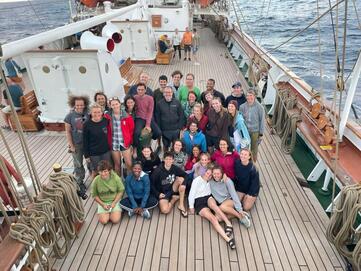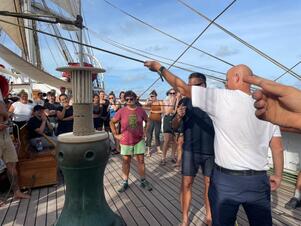
It’s been a while since the last post, but we’re currently writing to you safe at home in Montreal! We essentially lost track of time with all our activities in port and onboard the second leg.
We had an absolutely packed schedule in Jamaica, filled with outreach onboard Lehmkuhl and onshore, visits to the University of the West Indies Mona campus and marine research lab, and some exploration of the local cuisine thanks to our two new friends and colleagues, sea level scientist Deron Maitland and marine biologist Chauntelle Parkins, who joined the One Ocean course from UWI.
We had an absolutely packed schedule in Jamaica, filled with outreach onboard Lehmkuhl and onshore, visits to the University of the West Indies Mona campus and marine research lab, and some exploration of the local cuisine thanks to our two new friends and colleagues, sea level scientist Deron Maitland and marine biologist Chauntelle Parkins, who joined the One Ocean course from UWI.
After giving talks about the science being done onboard at UWI, we had the privilege of listening to research presentations given by other graduate students at the university. In contrast to what we might be used to at McGill, much of the graduate research is focused on local impacts of climate change. Many students’ work revolves around the restoration of mangroves and their role in the local ecosystem and carbon budget, while others presented projects on regional sea level change and the health of seagrasses and corals. While climate change certainly poses a global threat, the perspective of our Jamaica-based counterparts is hallmarked by quite localized and tangible consequences of climate change and potential solutions to them. Our discussions at UWI, among other things, highlighted the importance of communication across areas of study and of the incorporation of perspectives that are representative of the diversity of the people who will be impacted by future climate changes, into the mainstream of science.
The second leg of the sailing expedition was marked with even more rope splicing as we finally reached our maximum rope length of over 1000m! The long-awaited day of this experiment coincided with another long-awaited event: swimming! As we “heaved to” (stopped the ship) for the ocean temperature measurements, the trainees and crew all enjoyed a couple of hours in the royal blue waters of the Caribbean Sea.
Just as we were wrapping up our experiments, the beautiful blue skies turned as we finally got some “interesting weather” as Prof. Spengler would say and we were doused in some refreshing rain. It was thus only fitting that we receive some meteorology lectures to understand the strange system we were sailing through. Other valuable discussions around climate action and EDI (equity-diversity-inclusion) were led by female professors and crew members who shared with us their experiences as women in male dominated fields. The grand finale to our last leg were the singing practices which led into our loud arrival in the Havana port: some of us were shouting from above the sails and some of us were on deck chanting as many sea shanties as we could.
The second leg of the sailing expedition was marked with even more rope splicing as we finally reached our maximum rope length of over 1000m! The long-awaited day of this experiment coincided with another long-awaited event: swimming! As we “heaved to” (stopped the ship) for the ocean temperature measurements, the trainees and crew all enjoyed a couple of hours in the royal blue waters of the Caribbean Sea.
Just as we were wrapping up our experiments, the beautiful blue skies turned as we finally got some “interesting weather” as Prof. Spengler would say and we were doused in some refreshing rain. It was thus only fitting that we receive some meteorology lectures to understand the strange system we were sailing through. Other valuable discussions around climate action and EDI (equity-diversity-inclusion) were led by female professors and crew members who shared with us their experiences as women in male dominated fields. The grand finale to our last leg were the singing practices which led into our loud arrival in the Havana port: some of us were shouting from above the sails and some of us were on deck chanting as many sea shanties as we could.

In Havana, we again had the pleasure of doing outreach work with local high school students coming onboard. We had the added difficulty of having to present in Spanish this time but everyone, Spanish speaker or not, did an excellent job preparing for this challenge and the students surprised us with how much they already knew about the changing ocean conditions. The students were very vocal and interested, giving us hope for the future of the environment. The rest of the time was spent finalizing our research projects, reflecting on our contributions throughout the course, and enjoying salsa music and a couple of well deserved drinks. As per usual before travelling, we spent some time running around trying to get a PCR test for our return to Canada and while there may have been some tears, we all promptly received our negative test results.
It was hard to say goodbye to all our newfound friends and colleagues in the end but we feel certain we will meet again and hopefully continue collaborating. We have learned that science is enriched by a diversity of backgrounds and that even though some projects may seem daunting, they are worthwhile and most likely to help us grow professionally and personally.
-Jeremy and Julia
It was hard to say goodbye to all our newfound friends and colleagues in the end but we feel certain we will meet again and hopefully continue collaborating. We have learned that science is enriched by a diversity of backgrounds and that even though some projects may seem daunting, they are worthwhile and most likely to help us grow professionally and personally.
-Jeremy and Julia
 RSS Feed
RSS Feed